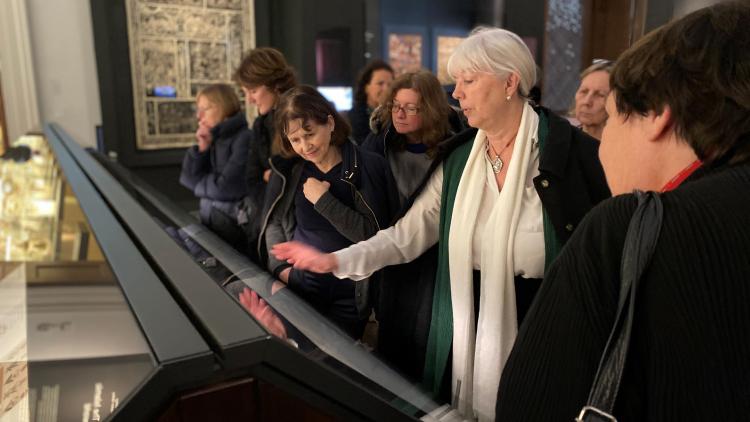MPhil/PhD in Japanese and Korean Studies


Key information
- Duration
- 3 years full time or 6 years part-time
- Attendance mode
- Full-time or part-time
- Location
- On campus
- Fees
-
Home (full-time): £4,860 per year
International (full-time): £23,390 per year - Entry requirements
-
We normally require a 2.1 bachelor's degree (or its equivalent) plus a Masters degree in appropriate subject area plus one reference. In exceptional cases we may accept applicants who do not meet these criteria if they show evidence of a strong Masters degree and/or appropriate level of relevant work experience. International applicants should also see Doctoral School English language requirements
Course overview
The Japan and Korea Department is able to supervise MPhil and PhD degrees by research and thesis in a wide range of cultural and linguistic subjects.
Intending research students should not feel constrained to limit their choice of topics to those indicated against the names of current staff members (postgraduate students have recently been working on a range of topics that include Japanese cinema, Kabuki texts, modern Japanese linguistics and literature, Meiji historical texts, Korean linguistics and literature, Korean colonial and eighteenth century history).
Research undertaken at MPhil and PhD level is based on literary, documentary, and archive material available at SOAS and also gathered during fieldwork in Japan and Korea.
Why study Japanese and Korean Studies at SOAS?
- SOAS is ranked 12th in the UK for Modern Languages (QS World University Rankings 2023)
- we are ranked 10th in the UK for East Asian Studies (Complete University Guide 2022)
- we are home to the largest concentration of Japan and Korean specialists outside of Japan and Korea
Structure
All students register in year 1 of the programme as MPhil students. The upgrade from MPhil to PhD takes place at the end of the first academic session for full time students (or at the end of the second academic session for part time students).
All new MPhil/PhD students are provided with a supervisory committee of three members, comprising a main or primary supervisor, and a second and third supervisor. The split in time commitment across the supervisory committee is 60:25:15. In the first year students are expected to meet their main supervisor on a bi-weekly basis for a period of at least one hour.
The student’s primary supervisor is always a member of the Department in which the student is registered. The second and third supervisors, who act in a supplementary advisory capacity, may be from the same Department, or other Departments/Centres in the Faculty of Languages and Cultures or in Departments/Centres in the other Faculties of the School. The student’s progress is further overseen by the Departmental Research Tutor.
Year 1
In the first year, students prepare for research by following a research training seminar series (RTS) convened at the Faculty level by the Associate Dean for Research and supported by the generic training on offer in the Doctoral School.
Students working in the fields of literature and cultural studies are also invited to participate in the additional training offered in the Centre for Cultural, Literary and Postcolonial Studies (CCLPS).
Students may also be encouraged by supervisors to attend additional taught courses relevant to their research and to their training needs. These may include specialist disciplinary, language or regional culture courses or research training in other Departments outside the Faculty.
Towards the end of the first term full-time students are required to submit a literature review of approximately 5000 words. Instructions for this is provided at the faculty research training seminars and students discuss with their supervisors how this literature review could be integrated into their upgrade research proposal and later their dissertation.
For the upgrade process year 1 full-time students (year 2 for part-time students) are required to submit a 10,000 word upgrade portfolio consisting of a research proposal and a core chapter. The relative word count of these two elements should be decided between the student and supervisory committee, but it is expected that the core chapter should be of no less that 3000 words. The deadline for the submission of this portfolio is by 15 May each year.
Research proposal
The research proposal typically includes the following elements:
- Research rationale and context of proposed research
- Main research questions
- Literature review
- Theoretical and methodological framework and considerations
- Proposed research methods
- Ethical issues (where applicable)
- Outlining structure of PhD dissertation
- Schedule of research and writing
- Bibliography.
Adjustments to one or more of these sections, including additions or deletions where appropriate, are possible by prior arrangement between the students and lead supervisors.
Core chapter
The core chapter should ideally be an analytical piece of writing in which the student by way of a case study shows how the research proposal translates into actual research. Depending on the nature of the research project access to primary source material can be difficult before the student undertakes the second-year research and in such cases the content should be agreed between the student and the supervisory committee.
The upgrade process from MPhil to PhD status is based upon an assessment of the upgrade portfolio by the student’s research committee, and upon on a 20-30 minute oral presentation, followed by a discussion. The oral presentation is given to departmental staff and research students. The three supervisors meet separately to discuss the outcome of the upgrade and to inform the student. On successful completion of the upgrade portfolio, students are formally upgraded to PhD and proceed to the second year. (If the assessors consider there to be shortcomings in the portfolio, students will be asked to revise it to their satisfaction before the upgrade to PhD status can be confirmed.) Students are not normally permitted to proceed to the second year until the upgrade process has been completed.
Year 2
The second year (or part time equivalent) is normally spent engaged in research. This may be by any combination of fieldwork and research in libraries and material collection as agreed between the student and the supervisor(s).
Year 3
The third year (or part time equivalent) is devoted to writing up research for the PhD thesis. During this time, students will normally give a presentation in a research seminar organised by the Departmental Research Tutor, comprising a select number of staff members with special expertise in the topic and other research students. During the third year (or part time equivalent) students will present draft chapters to their main supervisor for comment, before completing a final draft of the thesis. Once a full draft is complete, the work is assessed by all members of the supervisory committee and the student can either submit the thesis or move on to Continuation Status to be given a further 12 months to complete the thesis and submit for examination. The thesis must be completed within 48 months from the time of registration (or part time equivalent).
The thesis – not to exceed 100,000 words in length - is examined by two leading authorities in the field, one of whom has experience of examining in the University of London and at least one of whom is external to SOAS.
PhD Degrees are awarded by SOAS from registration in 2013 and are subject to SOAS regulations.
Important notice
The information on the website reflects the intended programme structure against the given academic session. The modules are indicative options of the content students can expect and are/have been previously taught as part of these programmes.
However, this information is published a long time in advance of enrolment and module content and availability is subject to change.
Teaching and learning
Academic staff and their research areas
- Dr Anders Karlsson MA PhD (Stockholm) - Korean language; literature and society; history of 19th century Korea
- Dr Griseldis Kirsch MA PhD (Trier) - Contemporary Japanese culture, with particular interest in Japanese visual media and popular culture
- Dr Grace Koh BA (American Univ. Paris), MST DPhil (Oxford) - Korean and East Asian literary traditions (prose and fiction); literary and intellectual history; travel literature and cultural encounters; critical theory and comparative literature
- Dr Owen Miller BA MA PhD (London) - Social and economic history of late 19th and early 20th century Korea; urban history; Korean nationalist and Marxist historiographies; economic history of North Korea
- Dr Barbara Pizziconi BA (Rome), MA (Tokyo Univ. Foreign Languages), PhD (Naples) - Japanese applied linguistics; language teaching methodology; second language acquisition with emphasis on pragmatic aspects; linguistic politeness
- Dr Filippo Cervelli MA, PhD (Oxon) - Modern and contemporary Japanese literature and popular culture.
SOAS Library
SOAS Library is one of the world's most important academic libraries for the study of Africa, Asia and the Middle East, attracting scholars from all over the world. The Library houses over 1.2 million volumes, together with significant archival holdings, special collections and a growing network of electronic resources.
Employment
Graduates from the Department of East Asian Languages and Cultures develop competencies in intercultural awareness, analysis and communication. Demand for specialists with advanced proficiency in the languages of China, Japan and Korea has significantly increased in recent years, and graduates with these skills are highly sought after by employers.
Recent graduates have been hired by organisations including:
- Accenture
- Amazon
- Bloomberg LP
- Department for Work and Pensions
- European Alliance for Human Rights in North Korea
- European Commission
- ITN
- Japanese Government
- Korea Trade Centre (KOTRA)
- KPMG
- Mizuho Bank
- Nagahama Board of Education
- Nanjing Museum
- Pinsent Masons LLP
- PwC
- Seoul Metropolitan Government
- Shelterbox
- UNDP
Find out about our Careers Service.


